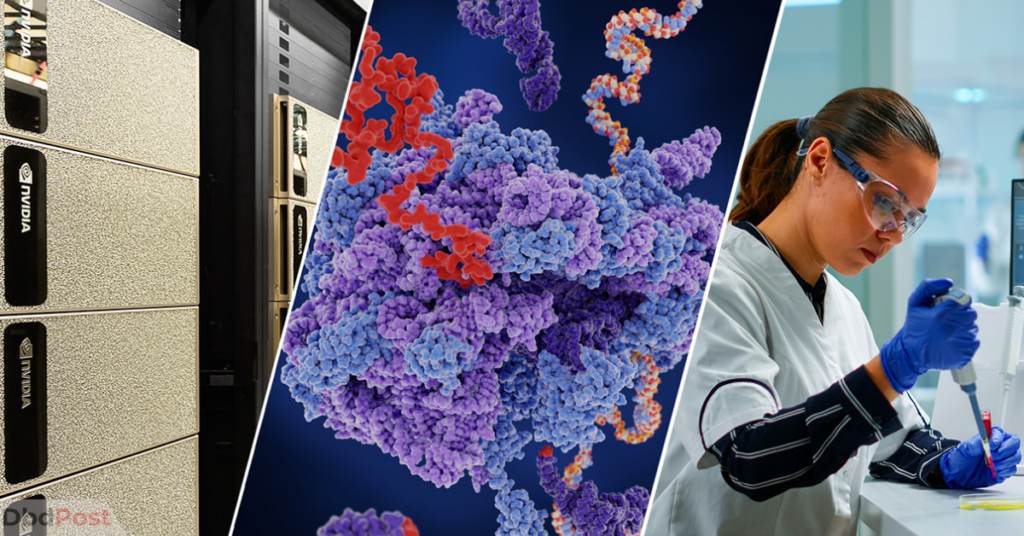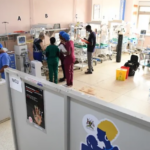The fusion of artificial intelligence, accelerated computing, and biological data redefines healthcare and life sciences, an industry valued at $10 trillion.
NVIDIA’s latest partnerships aim to advance drug discovery and genomic research while transforming patient care.
These collaborations include IQVIA, Illumina, Mayo Clinic, and the Arc Institute. They integrate generative and agentic AI technologies to tackle pressing health challenges.
Each partnership introduces innovative solutions that promise to change the future of healthcare.
Kimberly Powell, NVIDIA’s vice president of healthcare, highlights AI’s transformative potential. She believes AI can detect diseases earlier and discover treatments faster.
Powell emphasizes that combining NVIDIA’s technology with industry expertise will improve patient outcomes globally.
IQVIA represents a leap forward in clinical research and healthcare intelligence. The company creates custom models using NVIDIA’s AI Foundry services, which utilize a vast database of over 64 petabytes of healthcare information.
IQVIA also develops agentic AI solutions powered by NVIDIA AI Enterprise software. Tools like NVIDIA NIM™ microservices and Blueprints streamline research and clinical development.
Bhavik Patel of IQVIA says this partnership will accelerate the availability of new treatments.
Genomics Revolution with Illumina
Illumina, a leader in DNA sequencing, collaborates with NVIDIA to revolutionize genomics.
NVIDIA’s accelerated computing and AI tools enhance Illumina’s multi-omics analysis software, making genomic insights more accessible worldwide.
Illumina integrates its DRAGEN analysis software with NVIDIA’s platforms.
This collaboration democratizes researchers’ and pharmaceutical companies’ access to genomic tools, significantly supporting single-cell and spatial genomics applications.
NVIDIA’s RAPIDS™ data science software and BioNeMo™ generative AI models boost data analysis capabilities.
Illumina’s CTO, Steve Barnard, praises the collaboration. He notes that combining AI and multiomics data accelerates disease understanding and therapy development.
Transforming Pathology and Biomedical Research
The Mayo Clinic’s partnership with NVIDIA focuses on digital pathology. This critical field often involves manual processes, especially for cancer diagnosis and treatment planning.
Now, the Mayo Clinic Digital Pathology platform leverages cutting-edge technology.
The platform houses 20 million whole-slide images paired with 10 million patient records. NVIDIA’s DGX™ Blackwell systems and MONAI imaging platform support advanced pathology AI models aiming to deliver personalized diagnostics and treatment strategies.
This collaboration aligns with the Mayo Clinic’s broader vision. The clinic uses AI to develop predictive and efficient healthcare solutions.
NVIDIA’s Cosmos Nemotron vision language models and NIM microservices enhance diagnostic accuracy.
Meanwhile, the Arc Institute focuses on open-science biology AI models. These models generalize across multiple modalities, such as DNA, RNA, and proteins.
NVIDIA supports this work with BioNeMo and DGX Cloud platforms.
Arc Institute researchers use these tools to understand complex biological systems. Their work drives innovations in synthetic biology and disease research.
The collaboration enhances biomedical breakthroughs by scaling AI-driven tools.
AI is also addressing inefficiencies in healthcare operations. The sector dedicates $3 trillion annually to support growth. NVIDIA’s AI agents, instruments, and robotics promise to reduce these costs.
These technologies also create an AI-driven healthcare ecosystem worth hundreds of billions of dollars. Robots assist with surgery, patient monitoring, and operational management.
It underscores the potential of AI across every aspect of the industry.
NVIDIA’s partnerships address existing healthcare challenges and pioneer innovative solutions. They integrate cutting-edge technologies with domain expertise to redefine medicine.
This fusion of AI and biology opens unprecedented opportunities for improving human health.
- 107shares
- Facebook Messenger
About the author
Paul Dement is a seasoned journalist specializing in breaking news, national and international stories, reviews, and opinion pieces. With over a decade of experience, he is committed to delivering accurate, up-to-date coverage that helps people stay informed and engaged. Paul earned his Journalism degree from the University of Oklahoma and remains dedicated to covering the stories that truly matter to the global community.





